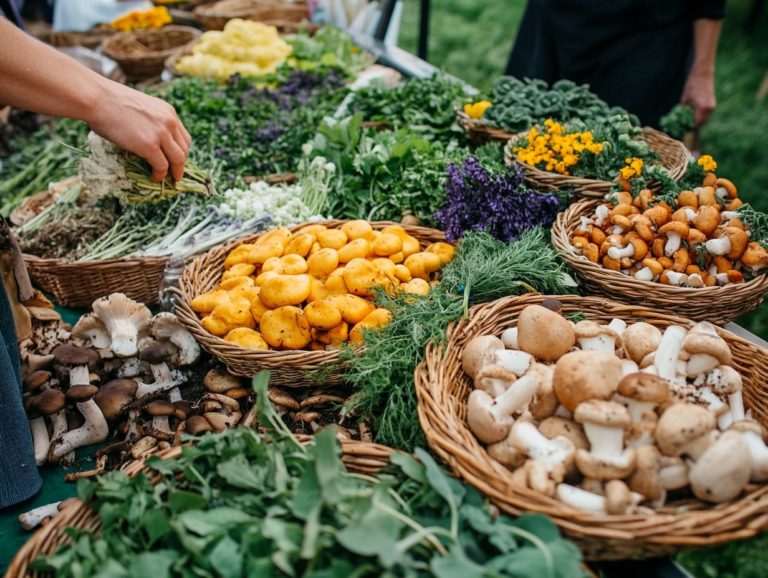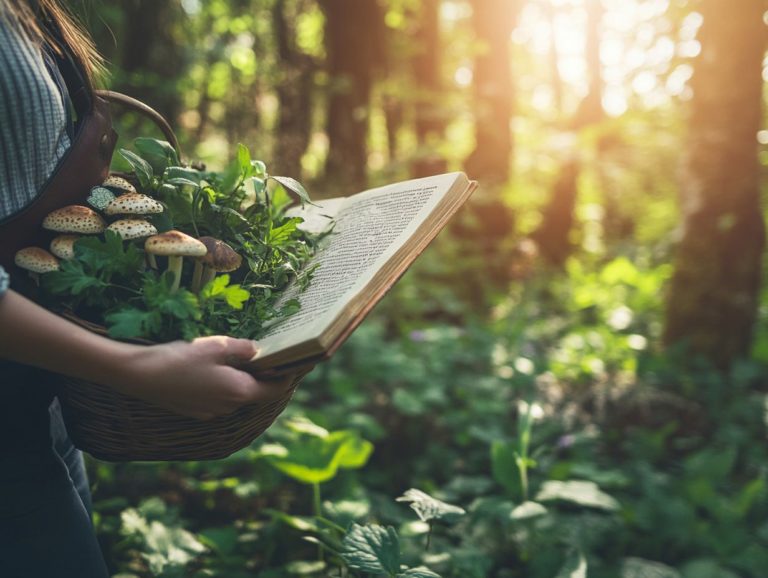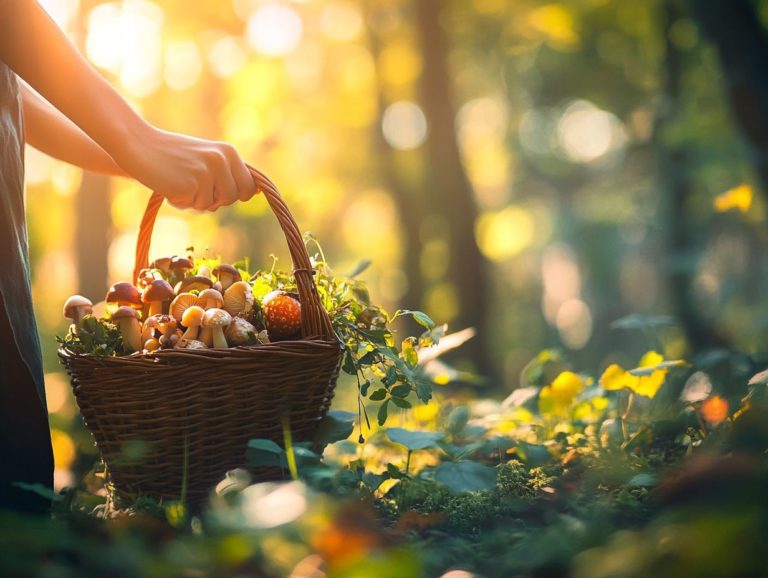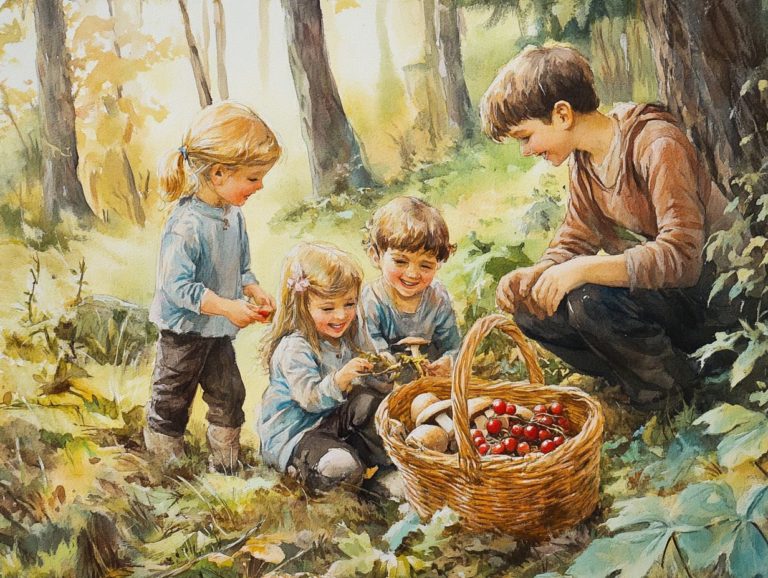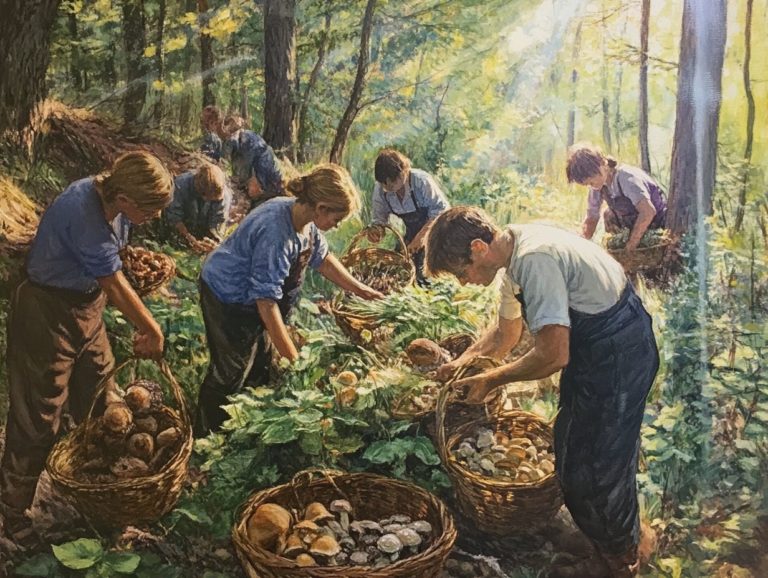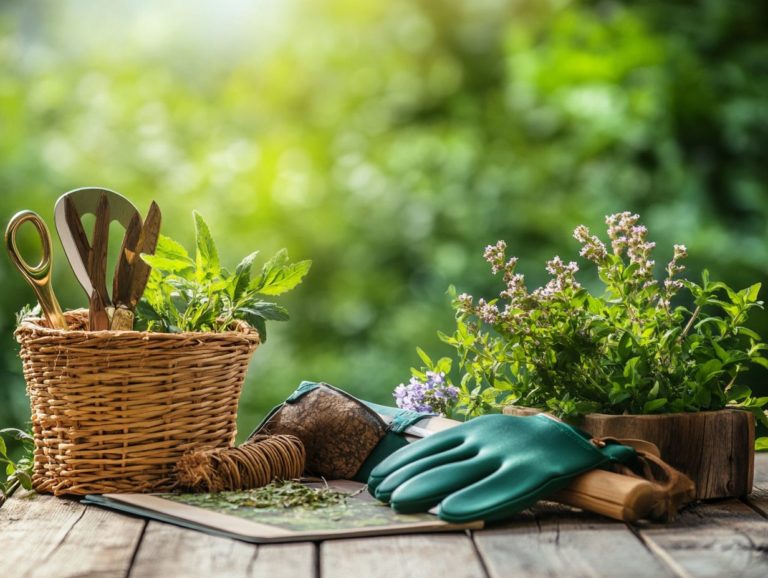Local Foraging Events and Their Importance
Local foraging has emerged as a sophisticated yet accessible means to connect with nature, nourish your body, and bolster community initiatives, fostering culinary value and environmental awareness.
This exploration delves into the essence of local foraging, tracing its historical roots and unveiling the myriad benefits it offers for both the environment and your personal well-being.
From vibrant farmers’ markets to captivating wild edibles walks and thriving community gardens, you ll discover a variety of foraging events that foster connection among people, including those focused on the culinary value of items like wild garlic and wild strawberries.
Learn how to get involved in these enriching experiences and understand why championing local foraging is vital for both our economy and ecosystem especially in urban foraging initiatives.
Prepare to immerse yourself in the joys and significance of foraging within your community, as you explore local plants like elderflower and the potential of pawpaw.
Contents
- Key Takeaways:
- What is Local Foraging?
- Benefits of Local Foraging
- Types of Local Foraging Events
- How to Participate in Local Foraging Events
- The Importance of Supporting Local Foraging
- Health and Wellness Benefits of Foraging
- Frequently Asked Questions
- What are local foraging events and why are they important?
- What types of foods are typically foraged at these events?
- How do local foraging events benefit the environment?
- Are local foraging events safe?
- Can anyone participate in local foraging events?
- Are there any cultural or historical significance to local foraging events?
Key Takeaways:
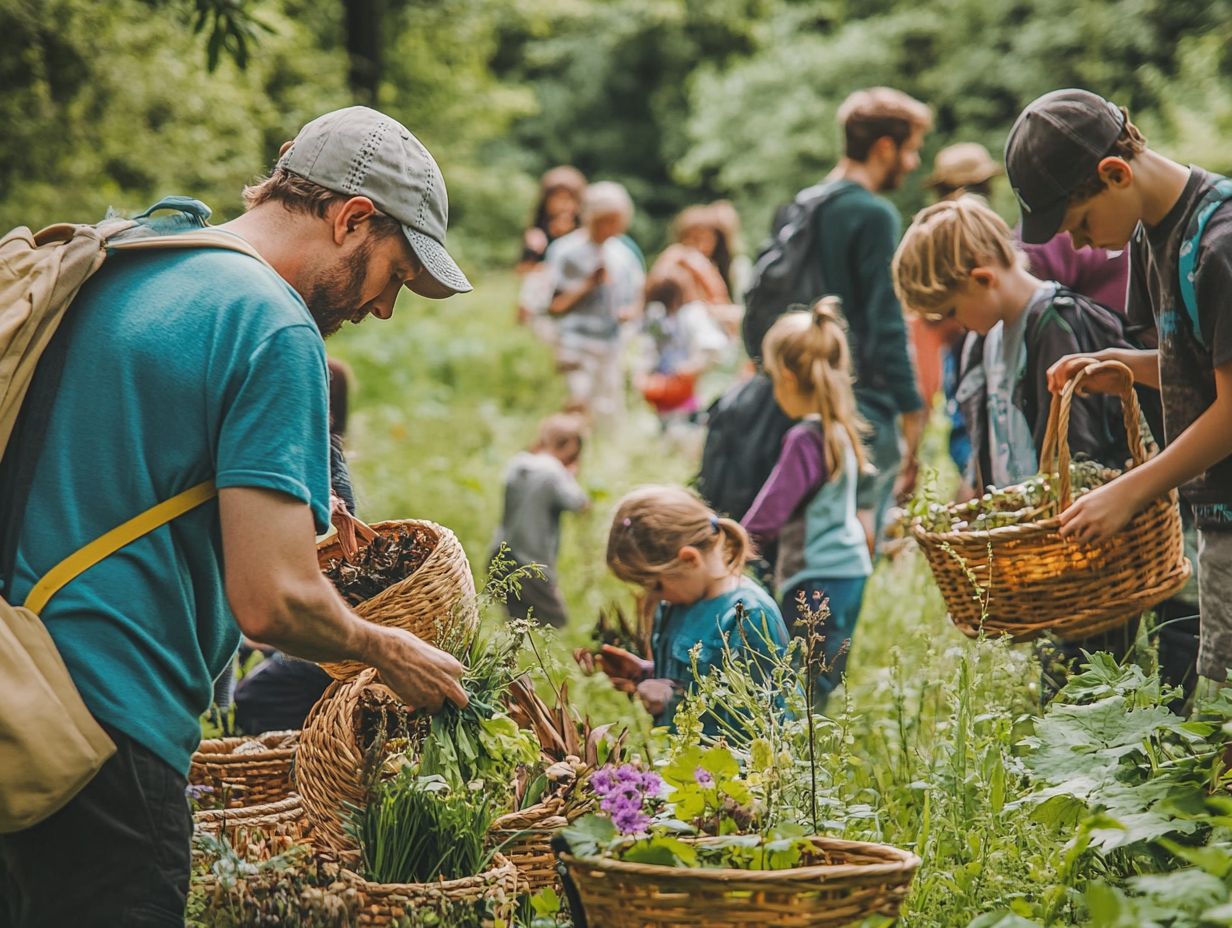
- Local foraging is the practice of gathering wild edible foods from the surrounding area, with a history dating back to ancient times.
- Participating in local foraging events offers environmental and health benefits, such as enhancing mental clarity, while also supporting the local economy and community.
- From farmers markets to wild edible walks, various types of local foraging events provide opportunities for individuals to connect with nature and learn about sustainable food options.
What is Local Foraging?
Local foraging, the art of gathering wild food from your surroundings, is steeped in rich cultural traditions, including Traditional Ecological Knowledge a term that refers to the understandings developed by indigenous communities over time regarding local ecosystems and food sources. Many indigenous communities, including the Moken, have thrived for centuries by relying on this practice, using their traditional knowledge to identify edible plants like wild garlic and wild strawberries.
Recently, urban foraging has surged in popularity as people recognize the value of connecting with nature while sourcing fresh, organic ingredients to combat issues like nature deficit disorder, which refers to the negative effects caused by a lack of contact with nature. With the growing interest in sustainable food production, more individuals are venturing into local ecosystems to uncover the culinary and health benefits of foraged foods, such as elderflower tea and a variety of medicinal plants, including Amaranth and Garlic Mustard.
Benefits of Local Foraging
The advantages of local foraging reach far beyond the mere act of sourcing food; they offer mental clarity, enhance health, and contribute positively to the environment by addressing issues like plant blindness.
By immersing yourself in foraging activities, you can tackle nature deficit disorder head-on and deepen your understanding of local ecosystems.
Foraging supports sustainable food systems by promoting biodiversity, enhancing community building, and fostering community ties as people come together to explore local flora and share their experiences.
This practice transcends being just a means of obtaining wild edibles; it paves the way for healthier lifestyles and communities that deeply value environmental stewardship and effective healthcare systems.
Types of Local Foraging Events
You can find a delightful variety of local foraging events that present unique opportunities for you to connect with nature, discover the world of edible plants, and learn about the cooking uses of plants like elderflower. Picture yourself at farmers markets, where foraged goods, such as wild garlic and wild strawberries, are proudly showcased, or joining organized wild edibles walks led by seasoned experts like Richard Maybey and David Siller.
These experiences offer invaluable insights for both seasoned enthusiasts and curious newcomers. Community gardens often emerge as vibrant educational hubs, teaching participants how to identify and cultivate foraged treasures nestled in urban environments like Philadelphia and Coventry.
Engaging in these events not only strengthens community ties but also elevates awareness around sustainable food systems, including responsible foraging practices and the importance of understanding food systems. Check out local foraging seasonal workshops near you for hands-on learning.
Don t miss out on the chance to discover delicious wild edibles right in your backyard! Join a local foraging group today!
Farmers Markets
Farmers markets are lively centers of local food production, inviting you to explore a bounty of fresh produce, including delightful foraged treasures like wild garlic and wild strawberries.
Farmers markets do much more than sell fresh food; they bolster local economies by ensuring that money circulates within the community, nurturing meaningful connections between producers and consumers.
Foragers venture into the countryside to find unique seasonal wild edibles, collaborating with local farmers to offer a diverse array of products that cater to health-conscious shoppers.
This partnership allows foragers to broaden their reach, while farmers gain the advantage of incorporating rare, foraged ingredients that elevate their offerings.
Such collaborations cultivate an ecosystem that champions locally-sourced foods, underscores sustainability, and inspires you to discover more about where your food comes from, ultimately enriching your community engagement and fortifying the local economy.
Wild Edibles Walks
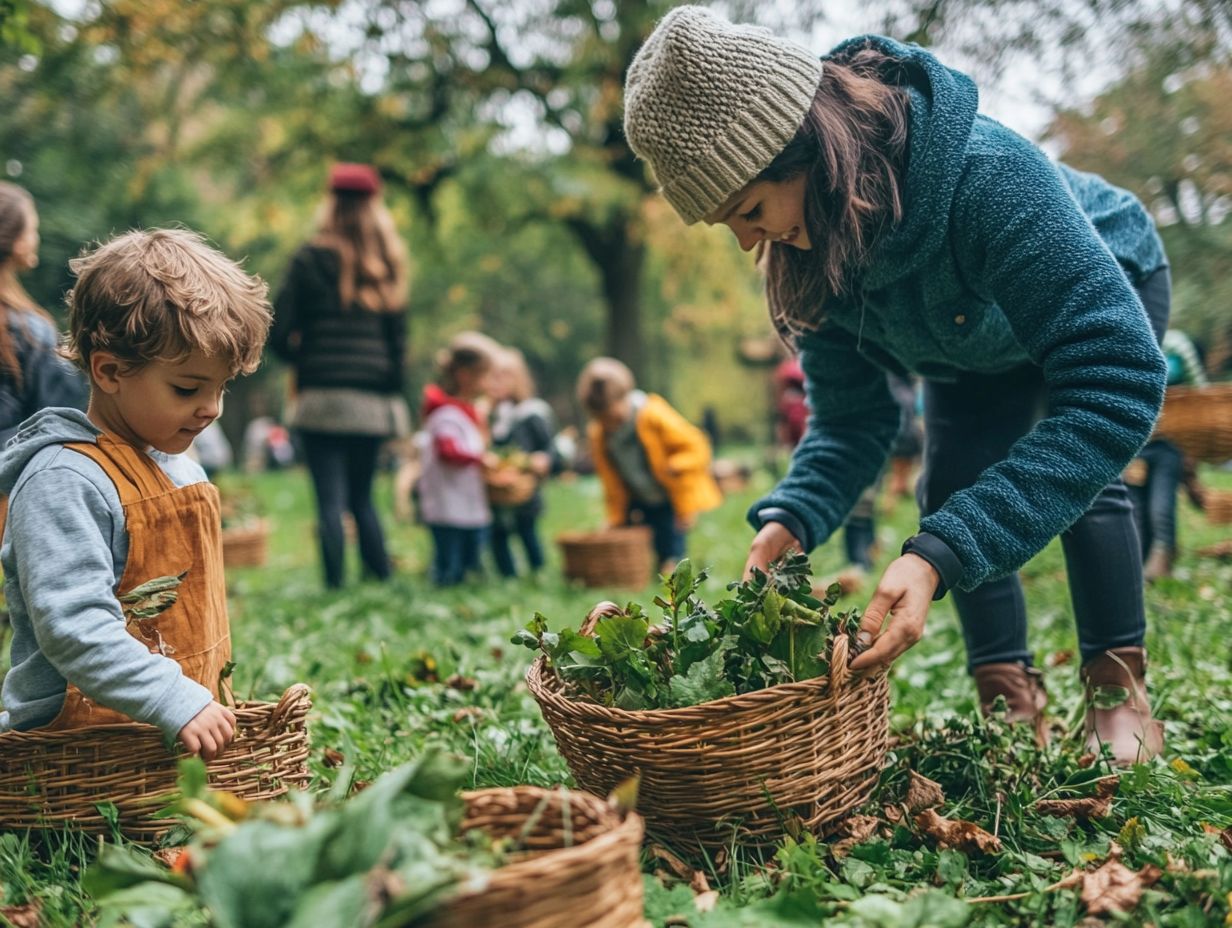
Wild edibles walks offer you a guided experience where you ll learn the art of mushroom identification and how to use traditional knowledge to distinguish edible plants.
These walks deepen your appreciation for local ecosystems and emphasize crucial safety practices to help you steer clear of toxic varieties.
By engaging with organizations like the North American Mycological Association or local community groups, you can gain firsthand experience from seasoned foragers who generously share invaluable insights on sustainable harvesting techniques.
Join these walks to gather wild edibles responsibly, equipping you with an understanding of your ecological impact and the importance of preserving habitat diversity all while reveling in the delightful bounties of nature.
Community Gardens
Community gardens are important places that enhance urban aesthetics while offering you opportunities for local foraging and education on sustainable food systems.
In these gardens, you find sanctuaries where individuals come together, cultivating not only plants but also a sense of belonging and community spirit.
As you collaborate with neighbors to grow vibrant vegetables and herbs, you forge bonds that extend well beyond the garden fence.
Engaging in urban foraging practices encourages you to explore the diverse flora around you, combating plant blindness the inability to notice or recognize plants around us and deepening your connection with nature.
These green spaces act as invaluable educational resources, teaching you about various plant species, their culinary uses, and their benefits for mental well-being.
Such initiatives enrich your knowledge and inspire healthier, more mindful living.
How to Participate in Local Foraging Events
Join local foraging events for an exciting and enriching adventure! However, it does require some thoughtful preparation and insight into how to find these opportunities in your area, especially during COVID-19.
By tapping into online resources and community boards, you can uncover events that resonate with your interests and embrace the principles of sustainable food systems.
Your preparation might involve assembling the right tools, familiarizing yourself with local edible plants like Japanese honeysuckle, and connecting with fellow enthusiasts to cultivate a sense of community and shared experiences.
Engage fully, and you ll find not just food, but a thriving network around you. Don t miss out on the chance to discover!
Finding Events in Your Area
Finding local foraging events can transform your urban exploration into an exciting adventure, offering insights into the delicious plants of pawpaw. You ll discover a wealth of resources through community boards, social media, and local groups like Wild Foodies of Philly. Here, you can share tips on foraging and sustainable food practices.
These platforms are invaluable for connecting with fellow foragers and diving deeper into your surroundings. Social media groups buzz with lively discussions, event announcements, and educational resources, keeping you in the loop about seasonal foraging opportunities.
Local gardening clubs frequently host workshops and meet-ups, nurturing a sense of community while promoting knowledge-sharing about edible plants.
By engaging with these communities, you ll have the chance to exchange experiences, tips, and foraging locations. This ultimately enhances your skills and enjoyment in this rewarding pursuit, while cultivating a deeper appreciation for sustainable food systems.
Preparing for the Event
Preparing for local foraging events involves gathering the right tools and understanding safety practices to ensure you have a successful and enjoyable experience.
Equipping yourself with essentials like a sturdy basket for collecting, a reliable field guide to help identify local plants, including those with medicinal properties, and a first-aid kit can truly make a difference. You should also consider bringing gloves to protect against potential irritants, and a knife for safe cutting.
Practicing ethical harvesting methods is vital; only take what you need and be mindful to leave enough for wildlife and future growth. Familiarizing yourself with the area and its flora through local workshops or guided excursions can enhance your foraging skills and boost your confidence.
This way, you’ll not only enjoy the bounties of nature but also give back to it.
The Importance of Supporting Local Foraging
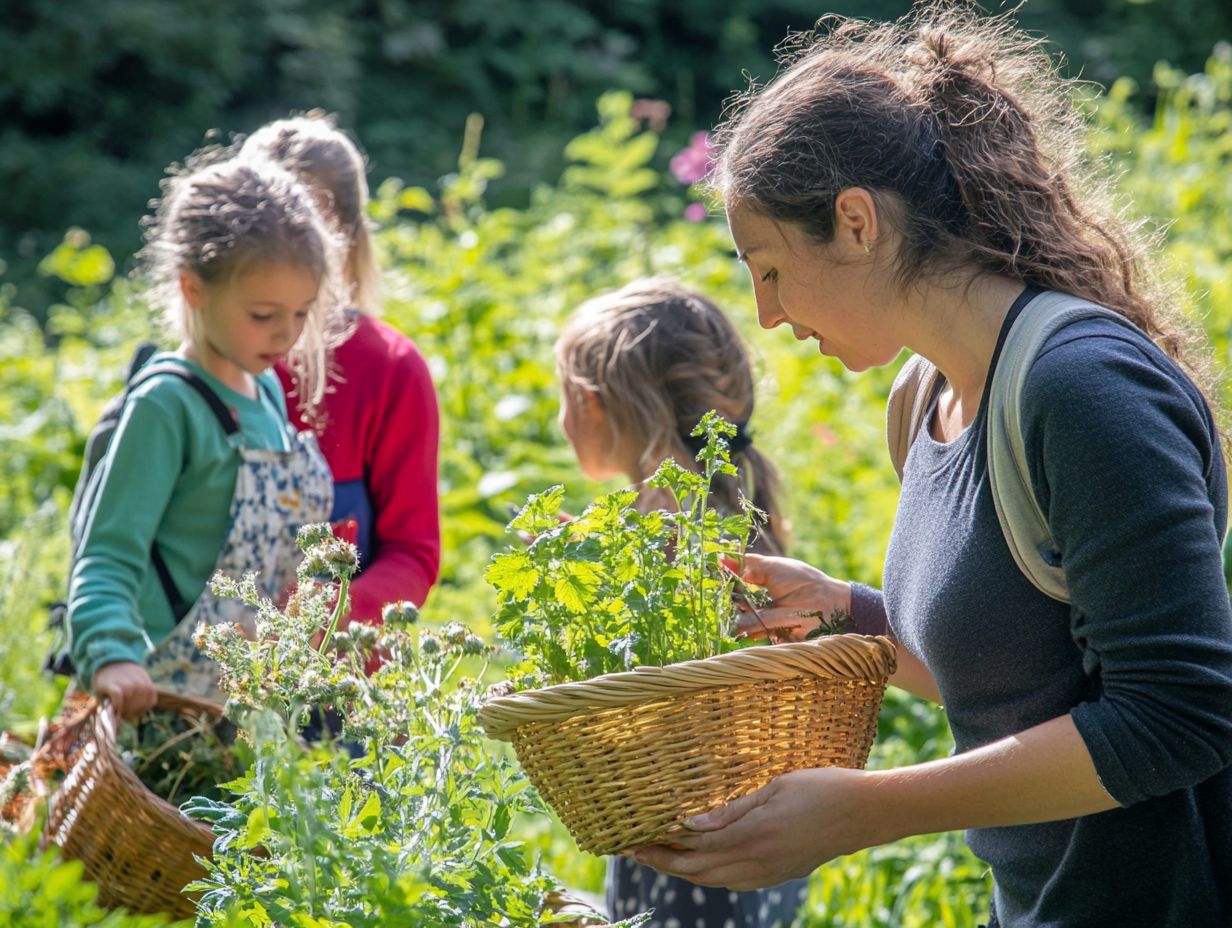
Supporting local foraging is essential for bolstering the local economy, enhancing environmental sustainability, including combating plant blindness (the tendency to overlook plants in our environment), and promoting health benefits within your community. As you and others recognize the value of foraged foods, you contribute to sustainable food systems that prioritize ecological balance and community wellness.
By embracing foraging practices, you deepen your connection to local ecosystems and cultivate an appreciation for the resources nature offers. This engagement can play a vital role in addressing concerns like nature deficit disorder, fostering a more harmonious relationship with the natural world.
Impact on Local Economy and Environment
Supporting local foraging has a profound impact on both the local economy and the environment. It cultivates sustainable food systems that benefit every member of the community.
By encouraging you to gather wild edibles like mushrooms, berries, and medicinal herbs, this practice not only offers fresh, nutritious options for local restaurants and markets but also enables you to connect with your natural surroundings.
Initiatives such as urban foraging workshops and community wild food events have introduced many to the richness of local biodiversity, fostering partnerships with small businesses that prioritize foraged ingredients.
These collaborations not only enhance food production but also contribute to restoring ecological health by raising awareness of native plant species, ultimately supporting local ecosystems and biodiversity.
Health and Wellness Benefits of Foraging
Foraging presents a wealth of health and wellness benefits that transcend mere dietary enhancements. Engaging in this practice can lead to improved mental clarity and a deeper connection to the traditional knowledge shared by indigenous communities.
Embracing foraging not only nourishes the body but also enriches the mind and spirit.
Don t miss out on the chance to discover hidden gems in your neighborhood! Join a local foraging event today!
Connecting with Nature
Connecting with nature through foraging can be your pathway to mental clarity and a therapeutic escape from the relentless stresses of urban life.
As you immerse yourself in the vibrant world of edible plants and wild herbs, you embark on an exciting journey that significantly boosts your emotional resilience. This hands-on approach fosters mindfulness, allowing you to step away from your fast-paced routines and distractions, even if just for a moment.
Exposure to green spaces and the act of gathering natural food can awaken a profound sense of purpose and connection, alleviating symptoms associated with a lack of connection to nature.
By venturing into the wild, you can rediscover joy and balance, ultimately enhancing your mental health and overall well-being.
Frequently Asked Questions
What are local foraging events and why are they important?
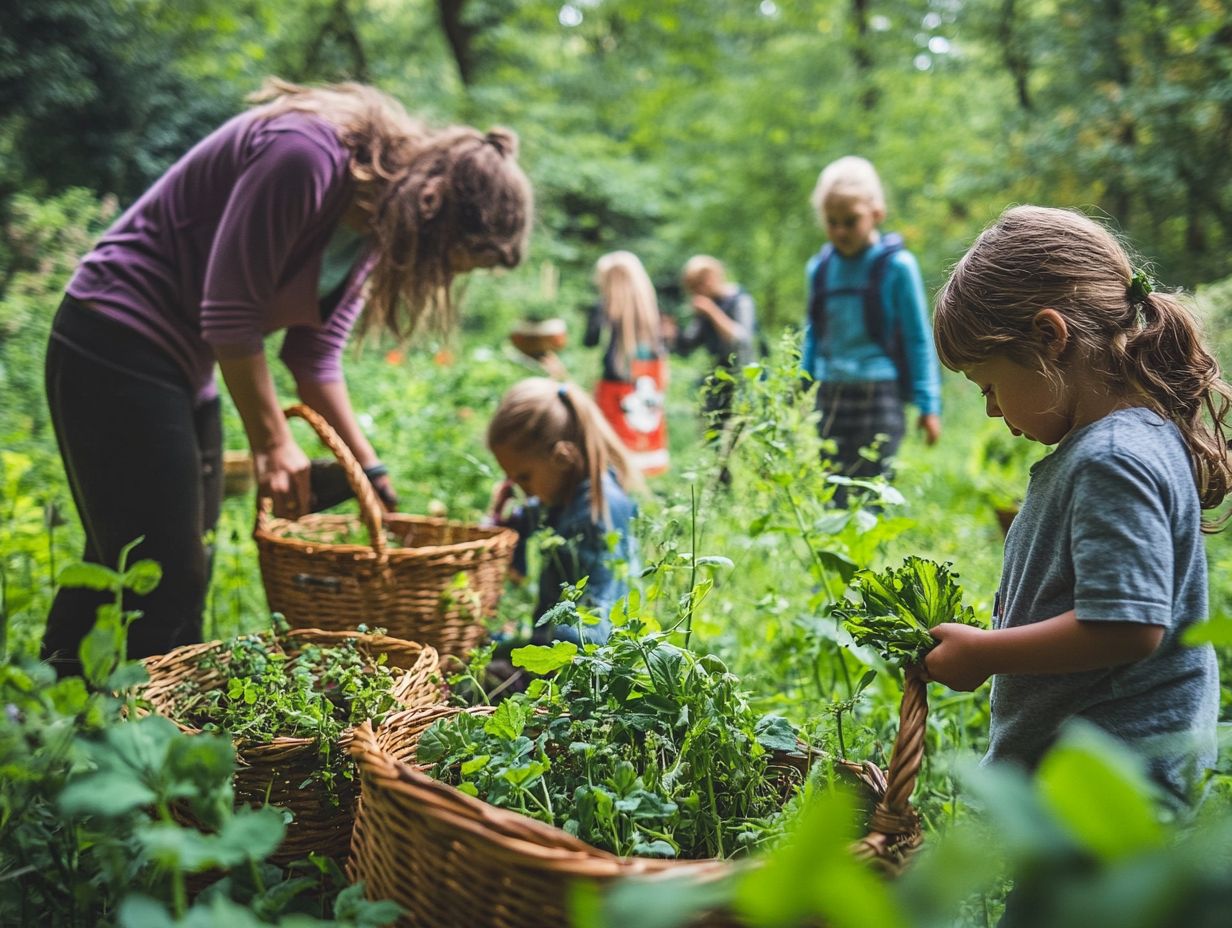
Local foraging events are gatherings where people come together to search for and harvest food from their surrounding environment. These events are important because they promote community building and sustainability by connecting people to their local ecosystems, highlighting the importance of local foraging networks.
What types of foods are typically foraged at these events?
The types of foods foraged at local events can vary depending on the region and season. Common items include wild berries, mushrooms, herbs, and nuts. Understanding the connection between foraging and local ecosystems can enhance your experience, as some events may also include hunting for wild game.
How do local foraging events benefit the environment?
Local foraging events promote sustainable practices by encouraging people to only take what they need and to do so in a way that minimizes harm to the environment. Learning about notable foraging events can further enhance this experience. By foraging locally, people can reduce their carbon footprint and support the preservation of natural habitats.
Are local foraging events safe?
Local foraging events should always be approached with caution and proper knowledge of the plants and fungi being harvested. It is important to only consume items that have been properly identified and to avoid any potential toxic or poisonous plants.
Can anyone participate in local foraging events?
Yes, most local foraging events are open to the public and welcome all levels of experience. However, it is always recommended to do some research beforehand and to ask questions during the event to ensure a safe and enjoyable experience.
Are there any cultural or historical significance to local foraging events?
Foraging has been a way of life for many cultures throughout history. Local foraging events often incorporate traditional practices and knowledge, making them a great way to learn about the land. Participating in top local foraging events can also help us reconnect with our ancestral ties and preserve cultural traditions.
Consider participating in a local foraging event to deepen your connection with nature and enhance your well-being!

